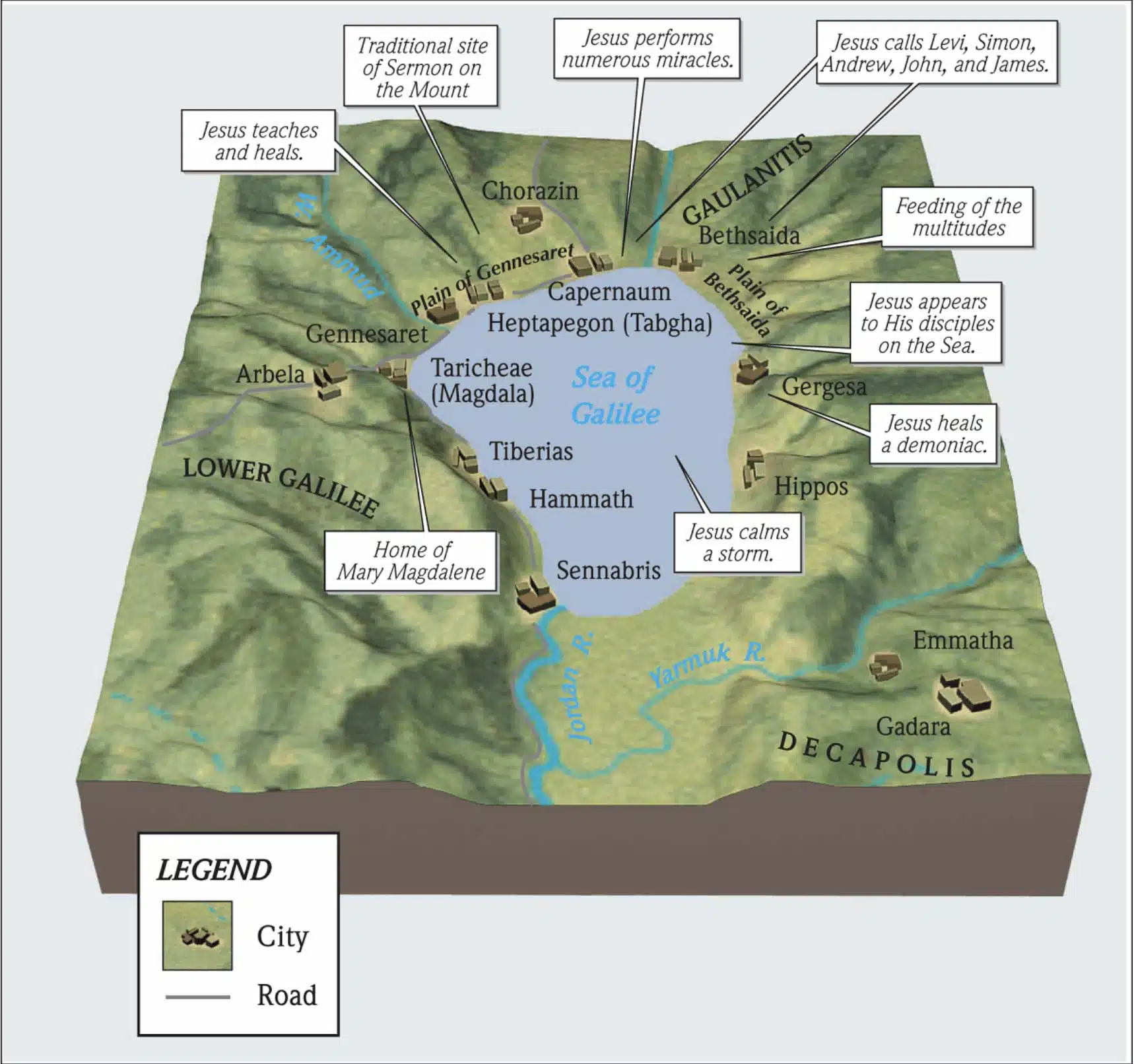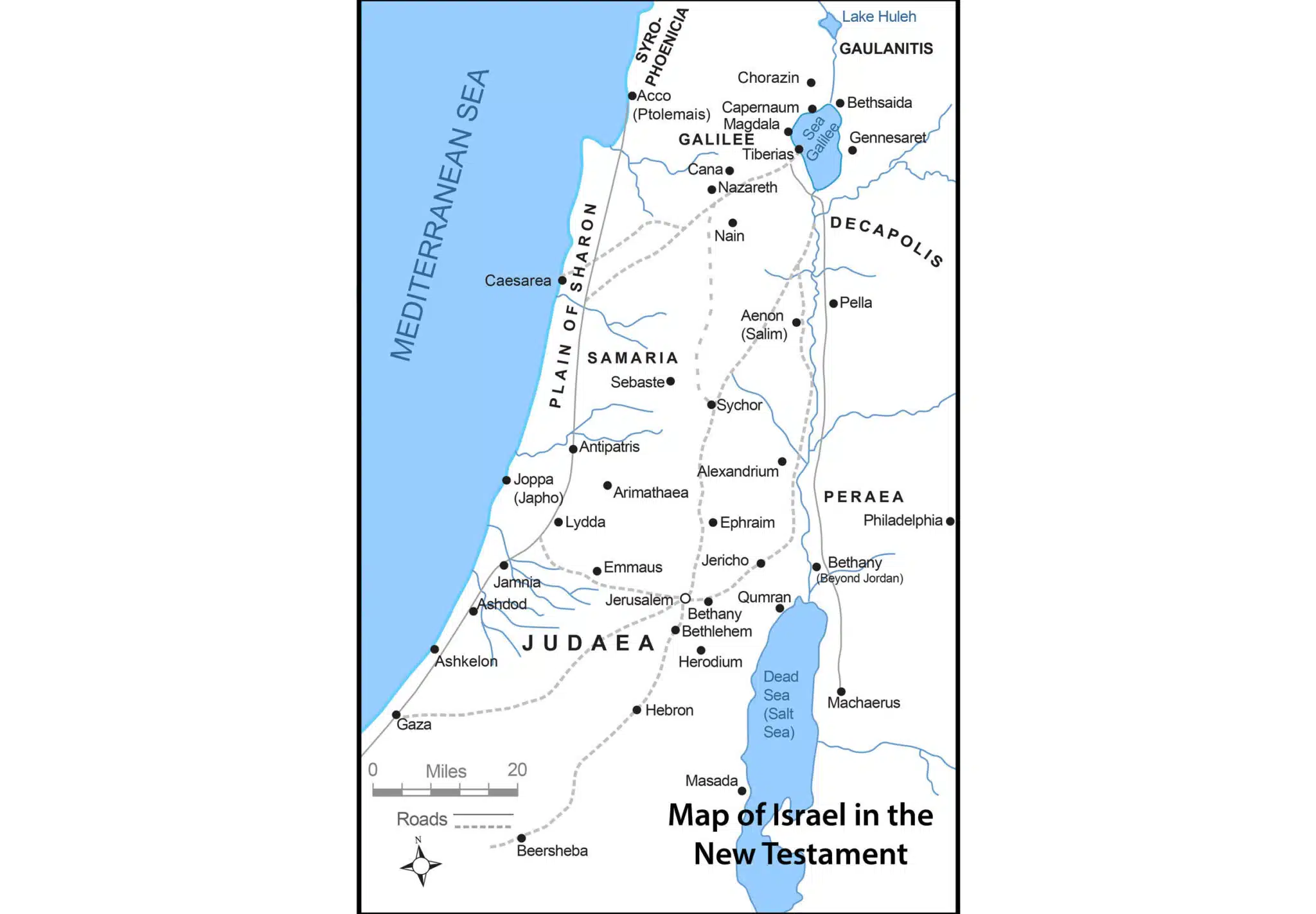Jesus begins to recruit His disciples. As Jesus walks along the shore of Galilee He sees two sets of brothers who are fishermen: Simon and Andrew, and James and John. Jesus calls each pair to leave their livelihood and follow him. They do so immediately.
The parallel accounts of this event are found in Mark 1:16-20 and Luke 5:1-11.
Matthew zooms in from his broad remark about Jesus beginning His public ministry to a specific instance with the word Now. As Jesus was walking by the Sea of Galilee (most likely in or around the fishing village of Capernaum) He saw two brothers (v 18). These brothers were Simon, who was called Peter, and Andrew (v 18).
Simon, along with James and John, will become one of Jesus’s closest disciples over the course of His earthly ministry. Simon’s nickname is Peter, and it is by this moniker that he is most often spoken of. Peter is the Anglicized version of the Greek word for “rock” or “stone” which is “Petros.” It is not entirely clear if Peter was already Simon’s nickname at this time or if it was given to him at a later time; Matthew might simply be doing his readers a courtesy by informing them of Peter’s most popular name.
Simon’s nickname is an appropriate one. Rocks are hard. Petros (Peter) was hard-headed. Sometimes for good, sometimes not. For example, just after confessing Jesus is the Messiah, the Son of God, Peter takes Jesus aside and rebukes Him for saying He is going to die (Matthew 16:16, 22). Simon’s personality appears to be outgoing and impulsive—which leads to some spectacular failures on Peter’s behalf. But Peter also is used by God in inspiring ways (Acts 2:14-40). Despite his hard-headedness and his failures, Jesus loves Peter and will lead this fisherman from Galilee to do great things for His Kingdom. Peter’s fearlessness will be a strength worked to good purposes by God.
Less is known about Simon’s brother, Andrew. He is mentioned by name only a few times in Scripture. In John’s Gospel, Andrew was the one who introduced Simon (Peter) to Jesus (John 1:40-41). The reason Jesus invites these brothers at this time to “Follow Me,” may have been because Jesus and Andrew had previously met. The Bible tells us, without much fanfare, that Andrew brings others to Jesus on at least two other occasions (John 6:8; 12:12).
When Jesus sees these two brothers, they are casting a net into the sea; for they were fishermen (v 18). Commercial fishing was an active industry on the Sea of Galilee. Fishermen organized themselves into businesses with some forming partnerships. Some fishermen owned their own boats and hired out hands. Capernaum was ideally situated for fishing on the Sea of Galilee. The Sea was a large lake shaped like an irregular oval. Galilee means “circle.” Many hamlets and towns of different backgrounds circled its shores.
In the Old Testament, when Galilee is spoken of (which is rarely) it is called “Chinnereth,” which is a Hebrew word that means “harp” since the sea is shaped like a harp (Numbers 34:11; Deuteronomy 3:17; Joshua 11:2; 12:3; 13:27; 19:35; 1Kings 15:20). Sometimes the Greek New Testament calls it “Gennesaret,” which is the Greek form of “Chinnereth” (Matthew 14:34; Mark 6:53; Luke 5:1). It is also called the “Sea of Tiberius” after the Caesar who reigned during Jesus’s adult life (John 6:1; 21:1). The town of Tiberius was established by Herod Antipas, and remains the name of the modern city on the western shore of the lake. Galilee was thirteen miles in length from north to its south. The Jordan river respectively fed and flowed from it at each of these ends. The sea was eight miles across at its widest point. In modern times it has 64 miles of surface area; its maximum depth is about 140 feet; and it has an average depth of 84 feet. In modern times, the eastern hills overlooking the Sea of Galilee are called the “Golan Heights.”
Jesus greets the two brothers while they fish, saying, “Follow Me, and I will make you fishers of men” (v 19). Luke 5:1-11 gives a more descriptive account of this moment. From Luke we learn that this conversation took place in the morning after a poor night of fishing. Simon and Andrew were cleaning their nets (by casting them into the sea), when Jesus hopped in their boat and asked for Simon to take it further from the shoreline. Jesus then asked Simon to lower his nets into the waters. The experienced fisherman informs his passenger that it is not a time when fish can be caught. Jesus told him to do it anyway. Simon obeys, and to his astonishment the net is so full of fish that he has to call for help to load them into the boat before his nets break.
Luke tells us that they catch so many fish that both Simon’s boat and his partner’s boat were on the verge of sinking. It is at this point that Simon realizes a portion of the authority Jesus has and he bids the Lord to depart, “for I am a sinful man!” Jesus assures Simon and it is at this moment that He said to them, “Follow Me, and I will make you fishers of men” (v 19). Jesus is telling these fishermen, that if they leave their nets and follow Him, they will be “catching the hearts and souls of men” rather than fish.
Both Luke and Matthew emphasize in their own way that Simon and Andrew obeyed. Luke tells us “they left everything” meaning they left their business and previous affairs then and there to follow Jesus. Matthew more strongly forces this point using the adverb, Immediately, before saying they left their nets and followed Him (v 20). Leaving their nets is a euphemism for “leaving everything” and it shows that they did not even take the time to unload (and sell) this large haul of fish.
Matthew, himself a hated tax collector, records Peter’s self-assessment that he is far from being rabbi material. In these Jewish fishing villages, being a rabbi, or teacher of the law, was a revered position. It was likely more typical for Jewish men to ask the Rabbi for permission to “let me follow you” and become a rabbi themselves. In this case, Jesus commands Peter to “follow Me.” Peter had no illusions that he fit the normal mold for being a rabbi. As we will see, Jesus seemed to emphasize commitment to the cause over aptitude when it came to selecting His followers. Each disciple, except Judas, will die as witnesses for Jesus. For the cause of establishing His spiritual kingdom.
Matthew’s phrase, Going on from there, suggests a continuous event between Jesus’s calling of Simon and Andrew and His calling of the next pair of brothers. He saw two other brothers, James the son of Zebedee, and John his brother (v 21).
The Zebedee brothers: James and John round out Jesus’s inner trio with Simon Peter. They appear to be close knit and boisterous. Their father’s name Zebedee means “Gift of God,” though Jesus later nicknames them “Sons of Thunder” (Mark 3:17). At one point the “Thunder Brothers,” to the irritation of their fellow disciples, get their mother to ask Jesus to pick them to be the ones sitting at Jesus’s left and right when He inaugurates His kingdom. By asking to sit on His right and left, they are asking to be the next in charge (Matthew 20:20-24). James will be the first of the twelve disciples to be martyred, executed by Herod Agrippa I (Acts 12:1-2). Again, the title “Thunder Brothers” indicates that Jesus is looking for fighters rather than scholars.
John was James’s younger brother. He was most likely the youngest of the disciples. He would become the author of the Gospel of John and three short epistles (1 John, 2 John, 3 John). As an old man exiled on Patmos, John received apocalyptic visions and wrote the Book of Revelation.
Jesus saw these brothers, in the boat with Zebedee their father, mending their nets (v 21). Fishing was a family business for them. Matthew then simply tells us that He called them. We do not know the exact words Christ used, but the message was apparently similar to what He had said previously to Simon and Andrew. The Zebedee brothers’ response was the same as Simon and Andrew’s. Immediately they left the boat and their father, and followed Him (v 22). The fact that they left their father to manage the business without them displayed a strong personal commitment to Jesus. It also likely indicates that the prestige of being called to follow a rabbi was considered a substantially significant opportunity such that it was accepted both by father and sons as an acceptable sacrifice to be made to the family business.
Biblical Text
18 Now as Jesus was walking by the Sea of Galilee, He saw two brothers, Simon who was called Peter, and Andrew his brother, casting a net into the sea; for they were fishermen. 19 And He said to them, “Follow Me, and I will make you fishers of men.” 20 Immediately they left their nets and followed Him. 21 Going on from there He saw two other brothers, James the son of Zebedee, and John his brother, in the boat with Zebedee their father, mending their nets; and He called them. 22 Immediately they left the boat and their father, and followed Him.
Check out our other commentaries:
-
Matthew 24:45-51 meaning
Jesus tells the first of four parables to illustrate the things He told the disciples about His coming and the end of the age. The...... -
Matthew 20:1-7 meaning
Jesus tells the first half of the parable of the Vineyard laborers. He describes how the landowner continually goes out throughout the day to hire...... -
Philippians 2:12-16 meaning
Paul encourages the Philippians to have the mindset of Christ: to obey God no matter the earthly cost. To continually adopt this mindset takes hard...... -
Genesis 15:7-9 meaning
God begins a covenant with Abram. ...... -
Ruth 1:15-22 meaning
Ruth commits to following Naomi wherever she goes and following her God. She returns to Bethlehem with Naomi.......




